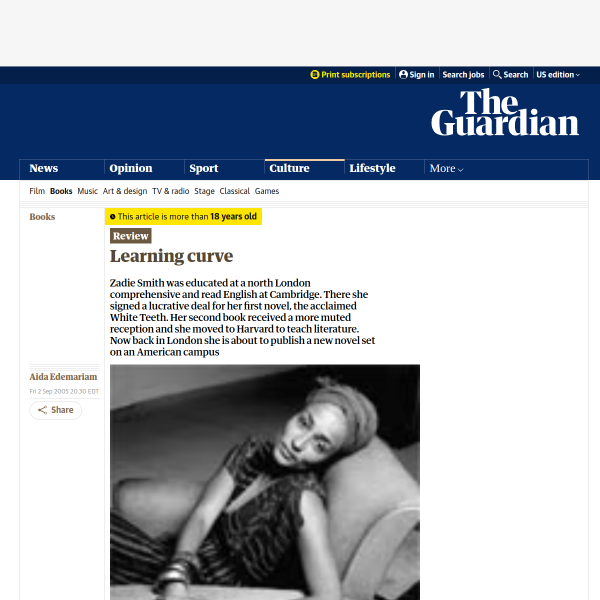Monday Morning Meeting: Issue #1
Posted by Richard on Monday, 28 April 2014Links randomly selected from the stuff I saw the previous week: an essay on climate change by Zadie Smith, a tweet about baseball statistics, a photo I took of cherry blossoms in Vancouver (which itself contains further links), and an interview with the developer of a social reading service. Some links are from longer than a week ago.
“Elegy for a Country’s Seasons” by Zadie Smith
The author of White Teeth, The Autograph Man, On Beauty and NW ruminates on climate change. Most of what I read on the subject are dire warnings, but she reminds us that the future is here, just not yet evenly distributed (Jamaica, Mauritius, and elsewhere) and that religion and class can colour one’s viewpoint on the subject, even if people do differ across national borders. She suggests that really we are mourning, that ”missing from the account is how much of our reaction is emotional.”
Potential win expectency of a single replay review
<p>The time between plays in baseball affords fans to think deeply about the game’s statistics. One such statistic, introduced to me by FanGraphs, a website and community studying baseball statistics, is win expectancy. The site’s owner defines win expectancy as “the percent chance a particular team will win based on the score, inning, outs, runners on base, and the run environment.” This year, Major League Baseball introduced replay review of contentious plays (with some exceptions, such as strikes and balls and the “neighbourhood play”). When a manager challenges a play, the umpires will dial into a “war room” in New York City, where anonymous officials will confirm, overturn, or let the play stand (that is, the replay officials make no call and defer to the on-field umpires). In the tweet highlighted here, statlas.co, a website that visualizes win expectancy during the course of a game, succinctly quantifies the potential outcomes of a particular replay challenge. Maybe one day, managers will be able to make, in real time, the calculations needed to make a wise challenge, though how soon remains to be seen, especially since electronic equipment is banned from dugouts. Maybe that day is here, since managers can call into the team’s video room (which they do) and by the time the team makes the decision to challenge (thirty seconds), they’ll know what’s at stake.</p>
<h3 class="title">
<a href="https://www.flickr.com/photos/sillygwailo/14023477651/"">Bike the Blossoms 2014 (my photo on Flickr taken during the event)</a>
</h3>
<p>This is a photograph I took on Saturday with my handheld supercomputer. At the time, I called it a cherry blossom cavern, though another wit called it a cherry blossom canopy, which sounds much less daunting. “Vancouver, BC is famous for its thousands of cherry trees (estimated 50,000)” reads the Wikipedia page on the subject (cherry blossoms, not the city). The page reminds readers of the trees’ blooming period, as “they begin to bloom in February yearly and peak in April.” If you blink, in other words, you might miss them. Fortunately, we have events that form part of the Vancouver Cherry Blossom Festival, which bills itself as “an annual spring celebration that wakes up Vancouver to the beauty of our 40,000 flowering cherry trees” who hold an annual tour of Vancouver by bike. The route is planned well in advance, so it’s uncertain whether the trees will have bloomed or have already shed their petals. We lucked out. (Further links with sources of the quotes can be found in the description of my photo.)</p>
<h3 class="title">
<a href="http://ihadtendollars.com/interviews/greg-leppert.html"">Thomas Dunlap interviews Greg Leppert, developer of Reading.am</a>
</h3>
<p>Greg Leppert wanted to be able to quickly post what he was reading without any commentary, and see what others were reading. Right or wrong, good or bad, when one clicks the bookmarklet, the current article shows up in your Reading.am stream. When people you follow post links to your stream, clicking on a link invokes Reading.am on that link for you. It then not only shows up in your stream, but lists who you saw that link from. (An automated /via, if you will.) When reading an article, say you’re not the first to read it. If so, when you invoke the bookmarklet on something directly, you see an overlay with the avatars of those that came before you. You then get a chance to ‘Yep’ or ‘Nope’ the post. The meanings of these are evolving through usage, but have tended to mean hearty agreement and hearty disagreement, respectively. Things get really interesting with the hooks one can setup. There are the usual suspects of Twitter, Facebook and the like (you even can have everything go to one Twitter account, and have only ‘Yep’ links go to a secondary Twitter account), and, even more intriguingly, you can setup your own endpoint. The custom hook is undocumented (I helped identify a bug through some blind testing), but one could imagine, with some elbow grease, setting up a custom hook to append a link to a text file hosted on Dropbox and then, at the end of the week, randomly choosing some of those links to write about in an email newsletter. This interview goes deep into Greg’s thoughts on his service, with special mention of how users have added a community on top of it with their @[x]isreading Twitter accounts. (My account is at @sglisreading, to answer your next question.)</p>




